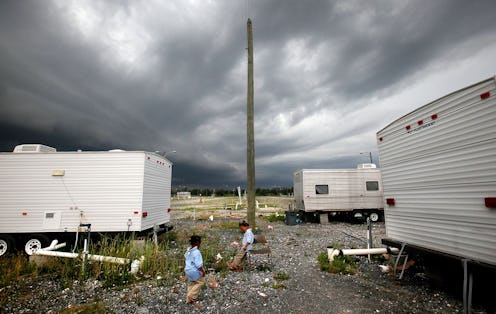News
FEMA Sold Off Disaster-Relief Shelters Two Days Before Harvey Destroyed Thousands Of Homes

On Saturday, the Associated Press reported that the Federal Emergency Management Agency, or FEMA, sold disaster-trailers two days before Hurricane Harvey made landfall in Texas. Considering the amount of people who were displaced by the strong winds and flooding, the decision to auction off the shelters has come under question. Weather reports indicated that the Category 4 storm affected nearly 79,000 homes in the southern state.
FEMA officials claimed that the trailers that had been sold shortly before Harvey's stunning arrival were used in the previous year's flooding in Southern Louisiana. The ones that were eventually returned to the agency carried some damage that made them reportedly "unfit" for redeployment.
Disaster recovery coordinator for FEMA, Michael Byrne, told the AP, "The ones you will hear about being auctioned are the used models that we've determined it's not cost-effective to refurbish. We're very rigid and strict about what we'll refurbish and it's got to be something that quite frankly any one of us would be comfortable living in and willing to put our families into."
Scholars who study the social impact of natural disasters on the environment have criticized FEMA's reported auctioning of trailers. The AP report quoted Irwin Redlener, director of the National Center for Disaster Preparedness at Columbia University, who described the selling as an "unfortunate decision." Redlener said that within FEMA, there's a "chasm between what they can supply and what is actually needed."
In spite of the claim that the disaster-trailers sold were unfit for redeployment, the AP reported that the Government Services Agency's online auction showcased 300 trailers that were described as carrying "minor" damage or no damage at all. Small problems such as a flat tire or missing bits of furniture were the only problems advertised, according to the AP report. Other FEMA-stated reasons for sending trailers off to get auctioned include permanent odors left due to cigarettes or small leaks in the trailer.
In dire situations like that of Harvey hitting Texas, FEMA is often and increasingly the only source of hope for locals devastated by the storm. The agency often offers loans to homeowners to repair or rebuild their affected residences while also helping victims with temporary housing options on the side like hotel rooms or the aforementioned trailers — if they are in stock. At this moment, the agency has reportedly auctioned off 300 units since the the start of 2017 with only 1,700 units left behind.
Shortly after the hurricane made landfall, FEMA spokesman Kurt Pickering informed the press that the trailers were only short-term methods to help those affected. "We are not intended to make people or households back the way they were before, to make them whole. We're designed to get them through the emergency," Puckering said.
To meet rising needs, the agency is currently seeking 4,500 units. But the AP report noted that officials were unable to provide definitive statements as to whether they could meet the additional needs of those impacted by the Hurricane Irma and other storms brewing during this year's hurricane season.
If a disaster-trailer goes on the auction block at such a critical hour, such as a few days before a hurricane makes landfall, there is always a concern that the unit could be sold for an exorbitant price to people in desperate need of shelter. The AP report is particularly stunning given the fact that Hurricane Harvey created a shocking housing issue for locals in Texas. Survivors have feared homelessness in the wake of the storm as reports show the powerful Hurricane Harvey severely damaged nearly 12,300 homes in Harris County alone.